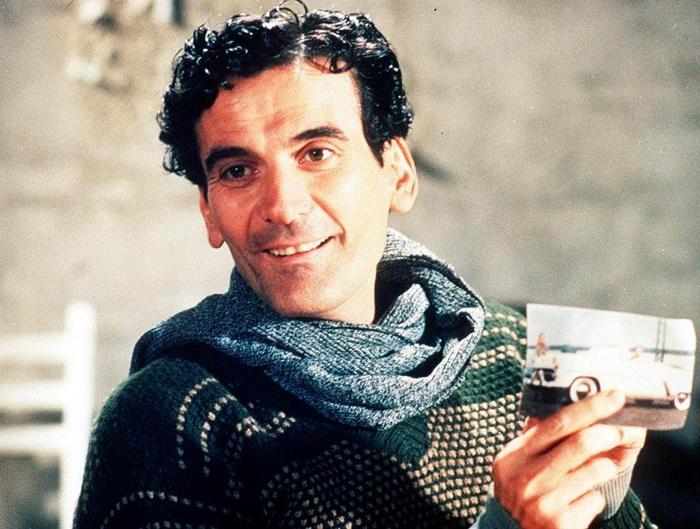Massimo Troisi, the farewell 26 years ago: it was June 4, 1994 .
If one is born in San Giorgio a Cremano (on the outskirts of Naples but in the heart of a devastated suburb, still in the countryside, not yet a city) and grows up in a small and overcrowded house (five brothers, two parents, two grandparents and five grandchildren), or is called Massimo Troisi or resigns to anonymity since childhood.
Massimo Troisi decided to honor his name and to fight against a difficult destiny, exacerbated from his youth by painful rheumatic fever which produced heart failure to the mitral valve which would have been fatal to him at just 41 years. On June 4, 1994 , just 12 hours after the end of his most ambitious and demanding film, " Il Postino", Massimo slipped from sleep to death in the home of his sister Annamaria, in Ostia, where he had found refuge after the efforts of a set he would not have had to face.
On the eve of the "Postman", Troisi had returned to America from the surgeon (De Beckey) who had already once operated on him in secret from his heart at the beginning of his career. He knew he could not face the double effort of the ideation and the interpretation (despite having left the direction to Michael Radford to get to the end of the shooting) but he chose not to spare himself to have the opportunity of Philippe Noiret in the role of the poet Neruda. He was resigned to meet his destiny, after all he had been playing hide and seek with death for ever and often had made irony outlining characters who disappear prematurely ("no, thanks coffee makes me nervous" and even titling his TV movie "Morto Troisi ... viva Troisi" (1982). Born on 19 February 1953 from a railway engineer and a housewife, the "Pulcinella without mask" that the public would have loved since the beginning with "Ricomincio da tre" 1981), was formed on the tables of the stage, an instinctive heir of Eduardo and of a mocking and sore Neapolitanity who would have ferried in a different way, that of the "new Naples" of Pino Daniele and Roberto De Simone. With the group "I Saraceni "and then with the stainless friends of" La Smorfia "(Lello Arena and Enzo Decaro) he soon left the vernacular boundaries of the village success to bring his language (a lively and torrential Neapolitan, syncopated and colorful," the only language that I know to speak, to be honest ") on national television networks and then to the cinema. As had happened to Eduardo and Totò, that spoken became understandable to all beyond words, synonymous with a universal feeling in which the mask became face and the character a universal paradigm.
The success was unexpected, sensational, immediate . It was the dawn of those 80s that brought the generation of the Moretti and the Benigni to the fore with him, but it was with Toscanaccio Roberto that Troisi found instinctive empathy, celebrated by the public with the resounding success of "There is nothing left but cry "(1984) in which his surreal" grammelot "acted as an effective counterpoint to the paradoxical historical frame of an exhilarating journey through time to the Medici Florence.
Critics had loved director Troisi's second feature more ("Sorry for the delay", 1983), Manon was always generous with the author, only to pay him great posthumous praise after the four nominations of "Il Postino" than in 1996 they earned the film an Oscar for the soundtrack by Luis Bacalov. But his filmography, often marked by the affective and artistic partnership with the screenwriter Anna Pavignano, deserves even today a reinterpretation from "The ways of the Lord are finished" (1987) to "I thought it was love ... and instead it was a buggy" ( 1991). Instead it was a colleague, Ettore Scola, who sensed the potential of an absolutely unique actor / author until he became the soul of his passionate "The journey of Captain Feacassa" (1990) in which he dressed the mask of Pulcinella and gave him the opportunity to talk on the set with a master like Marcello Mastroianni.
The result was a pair of absolutely unique films such as "What time is it?" and "Splendor" (in 1989) and for the first Massimo had the Volpi Cup at the Venice exhibition. There was no shortage of prizes on the Troisi bulletin board (from David to the Silver Ribbons) but the planetary success of "Il Postino" says how far the boy from San Giorgio a Cremano still had to go. Even today there is still the feeling of an unrepeatable and luminous talent that without Naples would not have existed but that in Naples has returned the stature of a true world capital. The Pulcinella without a mask today would have the right age to take the Oscar that fate has denied him. But up there (like down here) many love him the same.

